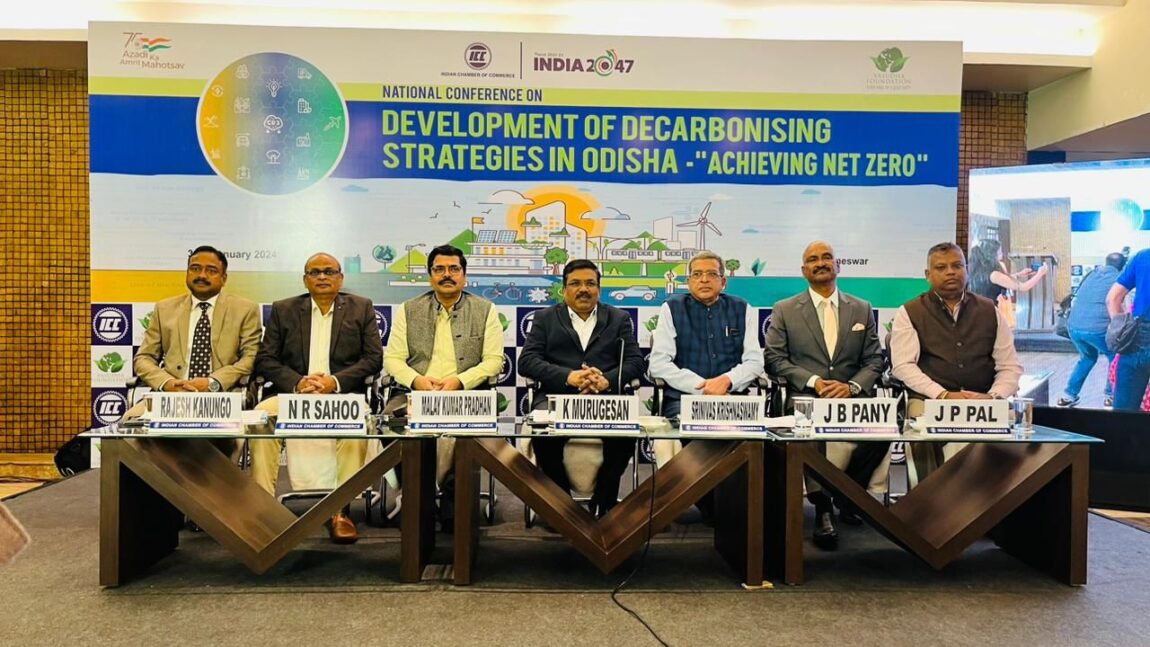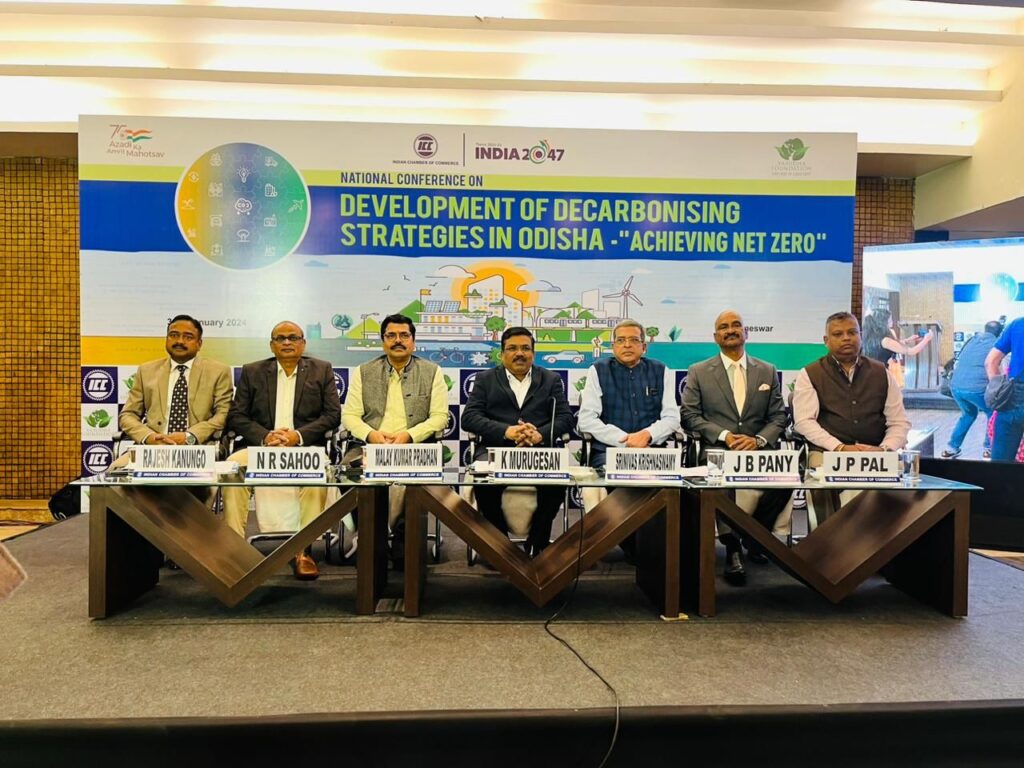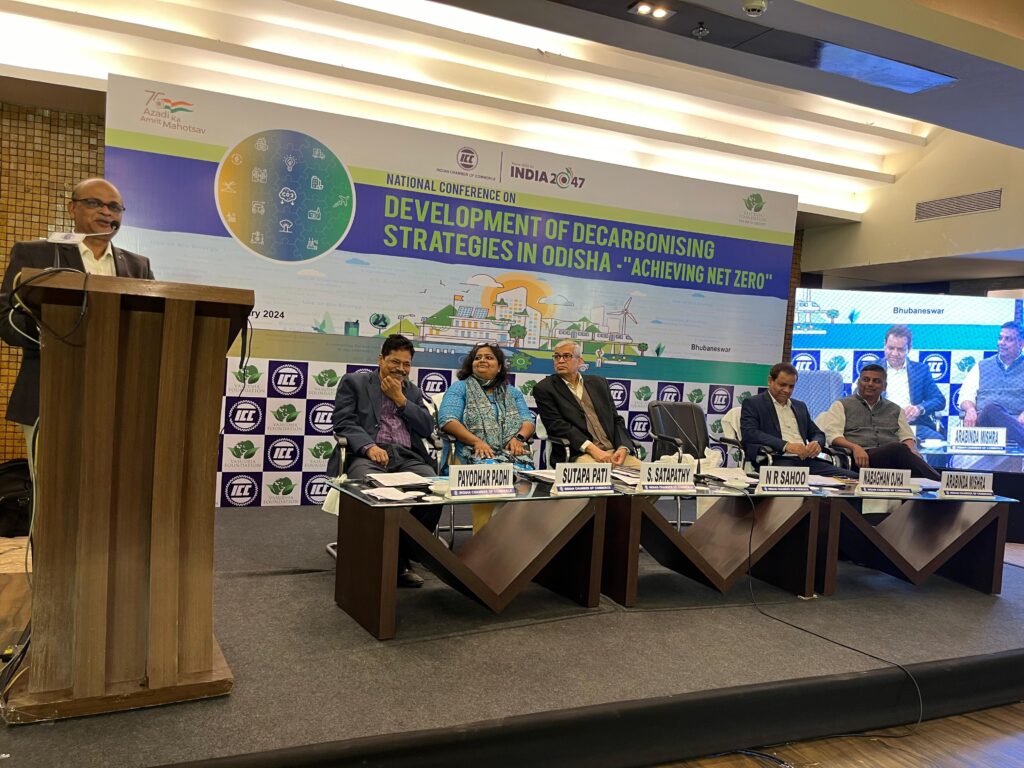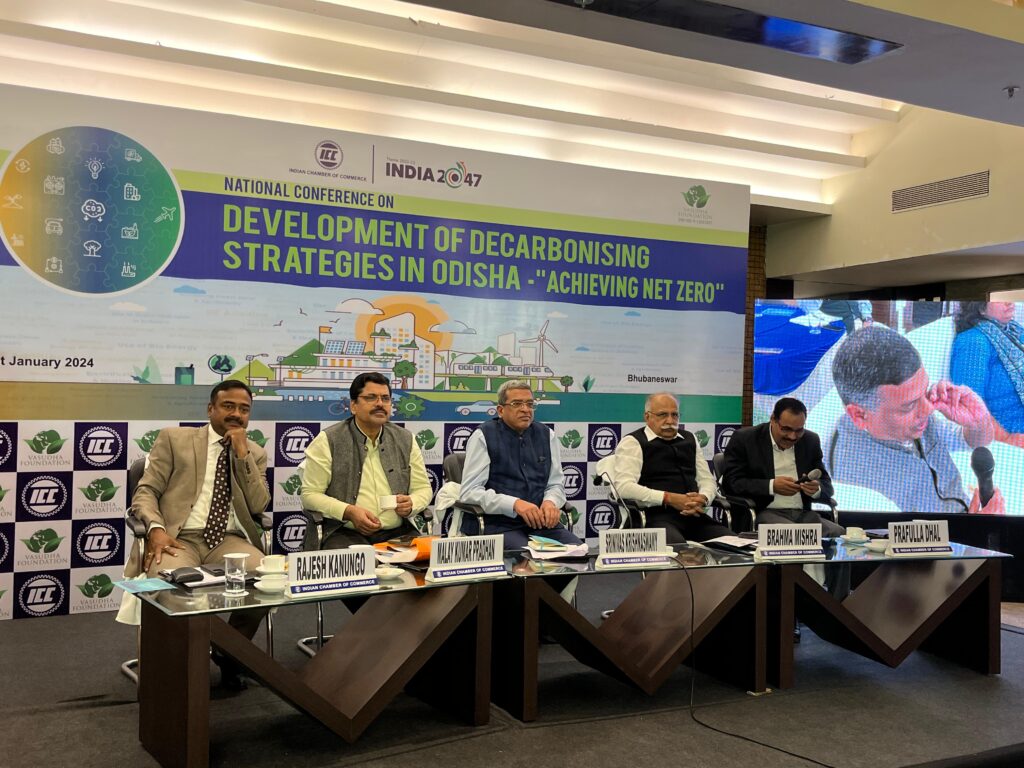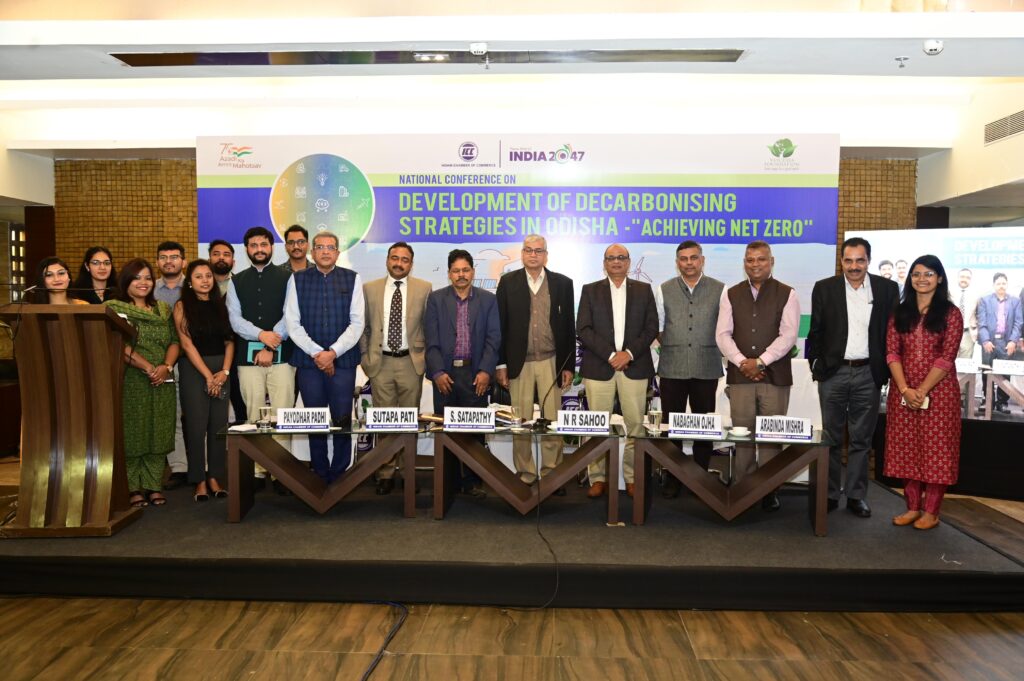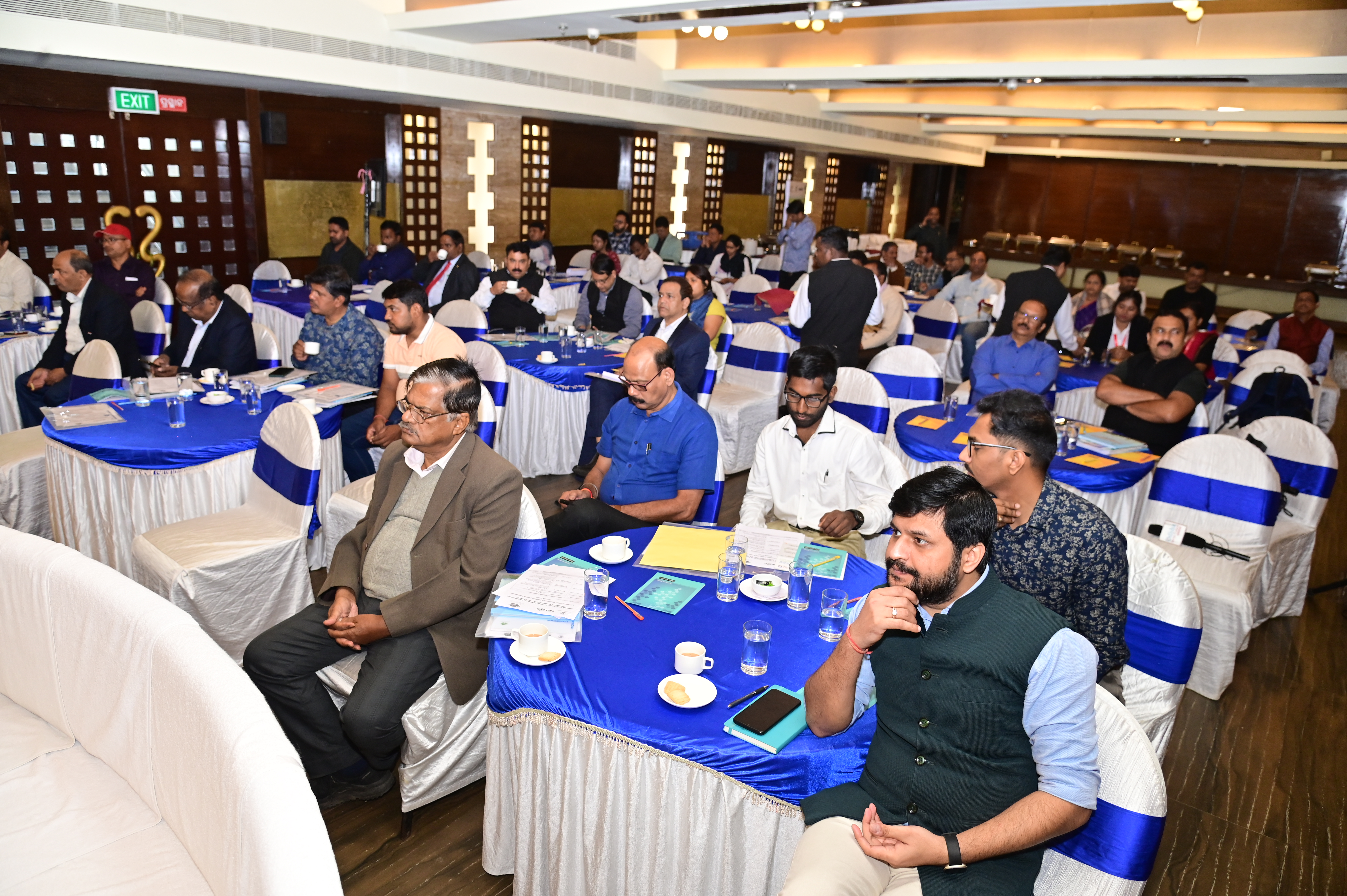31st January 2024 | Hotel New Marrion, Bhubaneswar
Vasudha Foundation and the Indian Chamber of Commerce (ICC) Odisha State Council jointly organised a national conference on ‘Development of Decarbonisation Strategies in Odisha- Achieving Net Zero’ on Wednesday, 31st January 2024, at Hotel New Marrion, Bhubaneswar. The national conference was organised to seek stakeholder perspectives and inputs on the possible pathways that Odisha could embark on towards becoming a Net Zero. Further, the stakeholders also discussed the opportunities, challenges, and potential solutions that the state could implement towards becoming Net Zero.
The workshop was attended by key participants from the Government of Odisha, industries, academia, civil societies, think tanks, and members of the press. The workshop was divided into three main sessions, the inaugural session followed by two technical sessions.
Inaugural Session:
In the inaugural session, Mr. J B Pany, Chairman, ICC Odisha State Council, and Mr. Srinivas Krishnaswamy, CEO, Vasudha Foundation, extended a warm welcome to the dignitaries and participants. They also provided a contextual overview of the workshop.
The special remarks were given by the Guest of Honour Dr. K. Murugesan, IFS, Member Secretary of Odisha State Pollution Control Board and Director of State Department of Environment, Forest and Climate Change, Government of Odisha and Dr. Malay Kumar Pradhan, Deputy Director of Directorate of Factories and Boilers, Government of Odisha & Principal Advisor to ESH Committee, ICC Odisha State Council who discussed the decarbonisation initiatives in Odisha.
The other dignitaries present at the inaugural sessions were, Dr. N R Sahoo, Convenor, ESH Committee, ICC Odisha, and Chief Environmental Engineer of Odisha State Pollution Control Board, Mr. Rajesh Kanungo, Member Core and Advisory Committee, and Co-Convenor, ESH Committee, ICC Odisha and Mr. Jyotiprakash Pal, Regional Director, ICC.
Key takeaways from the inaugural session:
- Odisha is the first state in the country to prepare the State Action Plan for Climate Change and is currently preparing a roadmap for a Net Zero strategy for Odisha.
- Odisha is an energy and emission-intensive state with high production of steel, aluminum, coal, mineral, and electricity, making decarbonisation of the state challenging. Decarbonising the state economy would require a state-specific solution while meeting the energy security targets and sustainable development goals.
- In alignment with the renewable power obligation (RPO) trajectory notified by the Ministry of Power, the state has planned to meet 43 percent of its electricity demand from renewable energy sources by 2030. Odisha Renewable Energy Policy 2022 is supporting this transition, with a specific focus on harnessing renewable energy in industrial production.
- Furthermore, the state has increased its green cover year by year, including agroforestry, mangrove forests, etc. thus ensuring additional carbon sequestration through land-based sinks.
- Each state has a unique socio-economic profile, energy consumption patterns, natural resources, and its management systems. Therefore, the states in India need to develop and implement their strategies and plans to decarbonise their respective economies.
- Odisha is seeing promise in the green hydrogen/ammonia space, with the state having received several project proposals for the production of green hydrogen/green ammonia.
- Policy/schemes for proving the fiscal incentives and subsidies, viability gap funding (VGF), and upfront capital investment from center and the state government towards the implementation of breakthrough technologies including green hydrogen/ ammonia production, carbon capture utilisation and storage, as well as coal gasification would fast-track the overall decarbonisation of Odisha.
- Going forward, citizen-centric lifestyle changes and adaptive strategies to minimise the carbon footprint were recommended and need to be taken forward including lifestyle for the environment (LIFE) initiatives announced at the Conference of Parties (COP) 26.
Technical Session 1:
The first technical session was on the theme of ‘Role of Stakeholders in Developing Decarbonisation Pathways in Odisha’ which focused on the opportunities and possible approaches towards mitigating GHG emissions in Odisha.
Mr. Srinivas Krishnaswamy, CEO, Vasudha Foundation, chaired the session, and he showcased the ‘India Climate & Energy Dashboard (ICED)’, a one-stop data portal for data on energy, climate, and key economic indicators; developed by Vasudha Foundation in collaboration with the NITI Aayog. The key speakers for the session were Dr. Malay Kumar Pradhan, Principal Advisor & Special Invitee, ESH Committee, ICC Odisha State Council & Deputy Director & Directorate of Factories & Boilers, Government of Odisha; Mr. Brahma Mishra President UCCI & MD, Bait Snaayou Smart Solutions Pvt Ltd; Mr. Rajesh Kanungo, Member Core & Advisory Committee & Co-Convenor, ESH committee, ICC Odisha State Council and Mr. Prafulla Dhal, State Head -CSR & Sustainability, JK Paper Mills Ltd.
Key takeaways from the Panel Discussion- I:
- For Odisha, which is an industry and mining-intensive state, there is an emphasised need for decarbonising the hard to abate industries with a specific focus on the steel, power, and mining sectors.
- The decarbonisation strategies should be integrated with business objectives to ensure industry interest and engagement. This will result in reducing emissions while improving the energy efficiency and profitability of the industry.
- Sector-specific technological innovations are crucial for mitigating environmental harm. For instance, nano-fertilisers can help combat soil and water pollution in agriculture, and prevent industries from depleting and polluting water resources.
- The key barriers to the decarbonisation journey of the state are communication challenges, lack of clarity on sustainability integration, organisational misalignment, and policy ambiguity. The barriers can be overcome by strategies like creating high-level frameworks on how to act cohesively, focusing on behavioral changes, adopting best practices, setting carbon reduction targets, conducting modeling system analysis, and prioritising technology choices.
- The radical policy changes such as shifting subsidies from chemical fertilisers to organic farming, and taxing carbon-intensive activities to incentivise renewable energy adoption will engage more industrial and public participation.
- To counter data and information gaps, having a state-level dashboard/portal containing data on the entire value chain of energy and end-use sectors, emissions, and other associated parameters is significant in crafting resilient decarbonisation pathways.
- It is important to raise awareness among the general public about the impacts of climate change and the role of individual actions in mitigating environmental damage.
- Collaboration across government, industry, and other stakeholders is essential to achieve the reduction in overall carbon emissions.
- Developing nations require assistance from developed countries through financial aid and technology transfer.
Technical Session 2:
The plenary session was followed by a panel discussion on the theme of ‘Localisation of Climate Actions and Role of Adaptation Strategies on Decarbonisation Pathways’.
Dr N R Sahoo, Convenor, ESH Committee, ICC Odisha, and Chief Environmental Engineer of Odisha State Pollution Control Board, provided the opening remarks to the session, he also moderated and chaired the session. The key speakers for the session were Dr. Sutapa Pati, Dean, School of Sustainability, XIM University, Dr. Pradipta K Panigrahi, Convenor, MSME Committee, ICC State Council & CEO G-On energy Controls, Dr. S Satapathy, Advisor – Climate, Vasudha Foundation, Dr. Arabinda Mishra, Chairperson, Development and Environment Futures Trusts, Mr. Nabaghan Ojha, State Project Manager in UNDP, and Dr. Payodhar Padhi, Chairman (R&D), Hi-Tech Medical College and Hospitals.
Key takeaways from the panel discussion-
- Climate-responsive planning and design is important for adaptation. The implementation architecture of each adaptation program/ intervention will vary according to that region’s/state’s conditions.
- Localisation of climate actions requires a bottom-up approach, involving districts, villages, and panchayats. This entails employing citizen science, advancing public education, and cultivating partnerships to establish local community networks. The goal is to enhance understanding and incorporate the perspectives and actions of communities in initiatives for decarbonisation and addressing climate change.
- For localisation of climate change adaptation, a strategy of adaptive social protection can be used, whereby the aspects of climate change are integrated into social protection schemes such as the Mahatma Gandhi National Rural Employment Guarantee Act 2005 (MGNREGA). There is a need for supportive government policies that enable localised approaches to climate change adaptation.
- To ensure widespread understanding and participation in local decarbonisation initiatives, it is essential to communicate ideas about climate change and sustainability using simple and locally relevant languages.
- Capacity building of agencies, industries, CSOs, and other stakeholders that are implementing the actions/interventions is crucial. It can be enabled by providing implementation agencies with the proper tools, practices, research, and decision-making processes.
- The use of scientific data and research is very important to prevent maladaptive practices that can cause more harm than good. Microclimatic data should be measured and reported to enable proper data-driven analysis which can then be used to address public issues and trends emerging from these data trends.
- There is a need for decarbonisation along the entire value chain of industries, in a manner that integrates principles of material circularity. Existing research and implementation on storage and waste management are not significant, thus requiring a concentrated effort to increase emphasis on recycling, reusing, and reducing waste.
- Moving beyond looking at fiscal viability and technological costs for decarbonisation, stakeholders should also undertake an economic analysis of their decarbonisation approach to identify the social costs and the social benefits their intervention may bring. Such a comprehensive evaluation will provide further motivation for undertaking such interventions.
To conclude the workshop, Team Vasudha and Team ICC extend warm gratitude to all the dignitaries, speakers, and participants for attending and engaging in discussions on various facets of state decarbonisation strategies.
The teams also emphasised that this workshop is just the beginning, and further deliberations are necessary to formulate state-specific strategies for decarbonising the Odisha economy. The deliberation during the workshop will be expanded to create state-wide decarbonisation pathways by incorporating the inputs gathered during the workshop with the focus on energy security and sustainable growth for all, so that no one is left behind in this transition journey.
The event was well attended, with over 90 participants from a wide spectrum of stakeholder groups. Participants and speakers both lauded the various works of the Vasudha Foundation, including the India Climate and Energy Dashboard, the sub-national work, and the initiative of organising this workshop.
Links to the media coverage are provided below:
https://fb.watch/pW0FF_ubaI/?mibextid=2JQ9oc
https://fb.watch/pW0wB2NIdk/?mibextid=2JQ9oc




